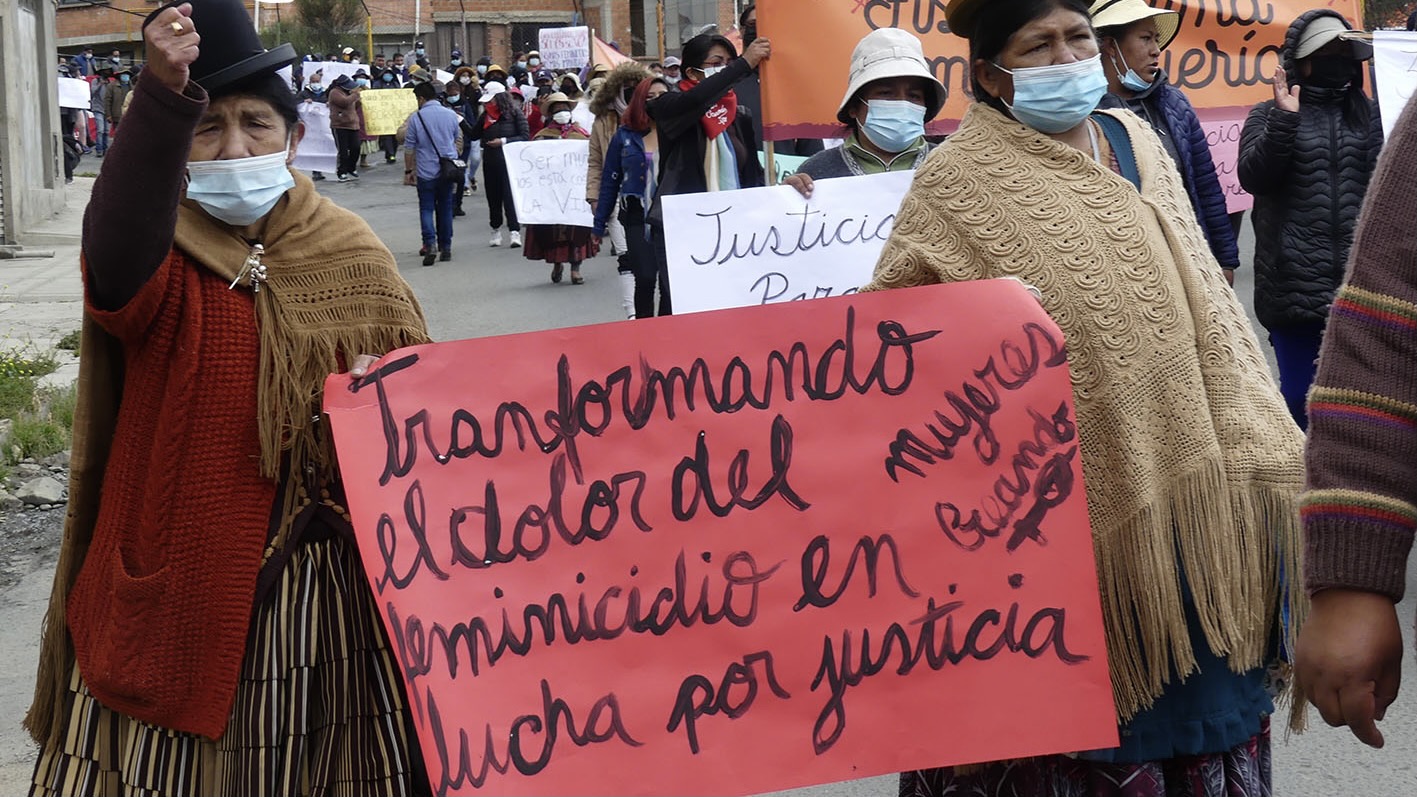On January 31, hundreds of women’s rights activists, along with relatives of the victims of gender-based violence and members of social organizations, held a massive march from the city of El Alto to Bolivia’s capital La Paz, demanding an end to violence and impunity for crimes against women due to judicial corruption.
The march was organized in the wake of the recent femicide of two teenagers by a serial offender of the crime, Richard Choque. The protesters demonstrated outside the criminal’s house in El Alto, where the bodies of two teenage girls, Iris Villca, 15, and Lucy Ramírez, 17, were recently found buried last week. From there, they marched for more than 12 kilometers to the Court of Justice in La Paz, demanding justice and exemplary punishment for Choque and the corrupt justice operators responsible for his illegal release.
In 2013, Choque was sentenced to 30 years in prison without the right to pardon for raping and murdering 21-year-old Blanca Rubí Limachi. However, in 2019, through a legal procedure that lasted only three days, Judge Rafael Alcón granted the culprit provisional release, alleging health problems and his good behavior. He benefited from a 18-month house arrest, which he did not comply with and no one watched.
Feminist activist María Galindo, member of the Mujeres Creando organization, told local media that “it is not only the case of this judge, it is a structural phenomenon in Bolivia” and emphasized that “we will never be silent again, nor will we forget.” Galindo met with government minister Eduardo del Castillo and gave him a list of 119 names of women, who were victims of femicides and rapes and whose aggressors were released by justice. The data was collected through a call on social networks contributed by victims and relatives of victims.
#VideoNoticias
El ministro de Gobierno, Eduardo del Castillo, se reunirá el martes con activistas que exigen encarcelar nuevamente a los autores de más de 120 hechos de violación y feminicidio en un plazo de 180 días.
Video: Roberto Guzmán pic.twitter.com/03CSjcyS7P— La Razón Digital (@LaRazon_Bolivia) January 31, 2022
According to reports, 32-year-old Choque is accused of raping dozens of women and had a very specific modus operandi. Choque would capture his victims using a false profile on social networks, posing as a woman offering work. He would organize recruitment meetings in lodgings where he had previously planted packages that seemed to be drugs. Then he would arrive there dressed as a police officer, and abuse his victims under the threat of denouncing them for drug trafficking. According to the calls and messages tracked on his fake Facebook profile, he contacted about 77 women.
Choque confessed to the recent murders and was once again sent to Chonchocoro high security prison in La Paz. His accomplice José Luis García Machaca, who also was granted house arrest in 2015 and had a 30-year prison sentence for participating in the same femicide, was also arrested. Judge Alcón, who freed the two convicts, was also taken into custody on preventive detention for six months. The Prosecutor’s Office said that he might have freed other convicts like Choque. Choque’s mother and sister were arrested for alleged complicity, it is estimated that they could not ignore what was happening in their house. Yesterday, Dr. Freddy TR, who issued a false medical certificate that benefited Choque, was also detained.
In addition to these arrests, as a response to Bolivian women’s cry for justice, on February 1, Bolivian President Luis Arce ordered the creation of a judicial commission to review all femicide and rape cases, since 2013, in which accused or sentenced persons were released. The president granted the commission a maximum period of 120 days to submit the results of its investigation, with respect to cases in which judges and prosecutors would have favored in some way the criminals who committed rapes or femicides.
Ante la preocupante situación y conducta de jueces, y operadores de justicia, instruimos la creación de la Comisión de Revisión de Casos de Violación y Feminicidio en el que los sentenciados fueron liberados. La misma deberá presentar resultados en un plazo máximo de 120 días.
— Luis Alberto Arce Catacora (Lucho Arce) (@LuchoXBolivia) February 1, 2022
The commission is composed of representatives from the ministries of Presidency, Justice, government, the presidents of the Chamber of Deputies and Senate, the presidents of the Supreme Court of Justice, the Judicial Council, the Constitutional Court of Bolivia, and the Attorney General and the Prosecutor. The commission held its first meeting yesterday, on February 4, in which its action plan was established.
According to the Economic Commission for Latin America (ECLAC), Bolivia has the highest femicide rate in the region. The country has one of the most progressive and tough laws against gender discrimination and violence against women in the region. However, conservatism and machismo still plague society.
In the light of the same, at the beginning of the year, President Arce’s government declared the year as “the year of the cultural revolution for depatriarchalization,” with the aim of establishing structural solutions to stop the persistent cases of violence against women in Bolivia.





